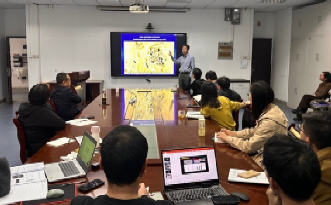On April 8th, 2024, Chengxin Gong, Professor and Head of Laboratory of Brain Metabolism, New York State Institute for Basic Research in Developmental Disabilities, visited the School of Basic Medicine under the invitation of Prof. Xiaochuan Wang from the Department of Pathophysiology. Prof. Gong gave an academic report entitled "New immunotherapy for Alzheimer's Disease" at the meeting room of the 8th floor of Building No.2.

Aiming at the multifactorial pathogenic characteristics of AD, Prof. Gong adopted a multi-target therapeutic strategy and constructed a 5-plex vaccine using CoPoP/PHAD liposome as the carrier, two Aβ; peptides and three phosphorylated tau peptides as the antigenic determinants, which was intravenously injected into 3×Tg-AD mice at 3-4 months and 9-10 months of age. At 12-13 months of age, the mice‘’s behavior was detected. It turns out that the AD mice showed remission of cognitive impairment and improvement of AD-like pathologies such as neurofibrillary tangles, senile plaques, neuronal loss, and synaptic damage. It proved that 5-plex vaccine exerts preventive and therapeutic anti-AD effects on 3×Tg-AD mice.

In his presentation, Prof. Gong introduced a novel active immunization strategy to intervene in AD, that is 5-plex vaccine, which turns the multi-target therapeutic strategy of AD into reality. The vaccine had visible therapeutic effects on AD mice with both tau pathology and Aβ; deposition, bringing a new idea for AD treatment. Prof. Gong had an in-depth discussion with the audience present at the end of the report.
The School of Basic Medicine managed to launch the BMS International Lecture Series in 2022, inviting internationally well-known experts to share the latest findings in medicine and health. The School of Basic Medicine tries to build the event into a brand and sustainable platform based on which a series of high-level international academic activities will be organized. It is hoped that the platform can bring together renowned scholars worldwide to share cutting-edge knowledge. More importantly, scholars can take this opportunity to enhance communication and mutual trust, and explore the potential for in-depth scientific cooperation, thus laying a solid foundation for jointly overcoming major global problems.
